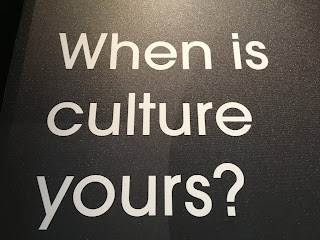WHEN CULTURE IS YOURS?
A while ago I visited an exhibition with a theme Things That Matters in the Tropen Museum, Amsterdam. In the exhibition, there were several angles were exposed: what we wear, when we feel at home, how climate changes our culture, our happy memories from home, how we create new life, the meaning of language, beliefs, fighting for our ideals, and celebrations.
One of the topics in the exhibition is about claiming a culture. When can we say that culture belongs to us? These are the words quoted from the Tropen Museum:
Sharing or stealing?
Is it acceptable to take over things over from
a culture that’s not your own? And who gets to decide? In the last few years, there’s been much debate about issues like these, particularly on social media.
This debate focuses on cultural appropriation: the co-option of elements from
another culture for one’s own purposes or profit. Things like symbols,
clothing, hairstyles, dance, music or language, for example.
Obviously, culture is always in flux and serves
as a rich source of inspiration for new creations. But if that’s done without
any acknowledgment or respect, people can be offended. That’s particularly
true within the context of unequal power relations; when the appropriating
group is in the majority and therefore more powerful than the group whose cultural
expressions are being used. Things That Matter offers dozens of examples that
sparked controversy.
I came back to these thoughts often when I visit Indonesian restaurants in the Netherlands with creativity and innovation in the culinary field. Sometimes, I hardly recognize a drink or a dish anymore because it is a bit too far from the origins. I love creativity and innovation, don't get me wrong. What I think we should do is to put an appropriate label into our creations so it becomes clear that a drink or a dish is inspired by Indonesian kitchen. It is not an Indonesian kitchen but INSPIRED BY.
A small example I saw in the Hague this week. A poster about Surabaya Sate. Surabaya Sate? There is no Surabaya Sate in Indonesia. The closest famous place for sate with Surabaya is Madura. We will not feel anything odd about this Surabaya Sate unless we are indigenous Indonesians.
The same feeling applies to everyone in this world, I guess. When parts of your culture are borrowed by others, you are deeper touched than the rest of the world. It is not necessarily negative. Exchanging and borrowing other's cultures is part of transnationalism.
Indonesia and the Netherlands share histories and undoubtedly share many culture's elements in many facets of life. I often count that there is no day passes without Indonesian elements in the Netherlands: tangible (persons, books, buildings, etc.) or intangibles (languages, stories, documentaries, etc.) I am sure the same things happen on the other side. Try to look closely and you discover that the Netherlands has influences in the daily life of Indonesians.
So the question of when culture is ours in the context of Indonesia and the Netherlands is naturally happening and unavoidable. We only need to be more careful when putting a label when it is adapted from other cultures.




Comments